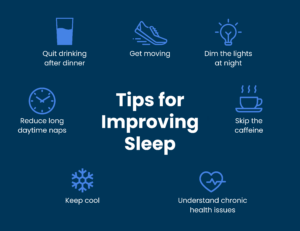When we talk about the quality of sleep, we often refer to “deep sleep”. A good amount of deep sleep can leave you feeling energized and fully restored when you wake up.
What is the Sleep Cycle?
A typical night’s sleep is divided into 5 to 6 cycles, each lasting about 60 to 90 minutes. Each cycle consists of two main phases: non-rapid eye movement (NREM) and rapid eye movement (REM) sleep. NREM sleep is further divided into four stages: light sleep, medium sleep, deep sleep, and very deep sleep.
In contrast, the modern lifestyle, filled with busy work schedules, academic pressures, and the constant distractions of social media, often leaves the younger generation in a state of chronic stress and anxiety. This persistent pressure can lead to insomnia and poor sleep quality, which in turn affects the ability to get enough deep sleep.
Why is Deep Sleep So Important?
Though deep sleep only accounts for about 25% of your total sleep, it plays a crucial role in maintaining physical health. Here’s why:
1. Fatigue Recovery and Brain Rest
During deep sleep, the cerebral cortex (the part of the brain responsible for thinking, memory, and sensory processing) essentially “shuts down” and rests completely. This is key for eliminating fatigue, restoring energy, and boosting immune function to fight illness.
2. Growth Hormone Release
In the deep sleep phase, the body produces a significant amount of growth hormone, which is vital for cell repair and promoting growth. This process is essential for overall health and recovery.
3. Memory Consolidation
Research shows that deep sleep is critical for consolidating memories. People who don’t get enough deep sleep often experience memory decline and difficulty retaining new information.
How Much Deep Sleep Do We Really Need?
The amount of deep sleep needed varies from person to person. However, most adults typically spend 15% to 25% of their total sleep time in deep sleep.
If you sleep for 8 hours, your deep sleep should generally fall between 72 to 120 minutes, or roughly 1 to 2 hours.
Does Sleeping Longer Mean Better Sleep Quality?

Sleep duration doesn’t necessarily correlate with sleep quality. In fact, sleeping for a longer period of time doesn’t always mean better rest. Excessive sleep can lead to feelings of fatigue the next day because it disrupts the natural sleep cycle.
On the other hand, if you optimize the deep sleep phase, even just 4 to 5 hours of sleep can leave you feeling refreshed. If you’re concerned about not getting enough deep sleep, here are three practices that can help you increase the amount of deep sleep:
1. Moderate Exercise
Light to moderate exercise during the day can help you increase deep sleep duration at night.
2. Weight Management
People who are overweight are more likely to suffer from sleep disturbances. Conditions like snoring or sleep apnea (caused by excess weight) can interfere with deep sleep. Managing weight can help reduce these issues and improve sleep quality.
3. Proper Medication Use
Under the guidance of a healthcare professional, using sleep aids or medications can help regulate sleep and ensure you get sufficient deep sleep.
Conclusion
While deep sleep is crucial for optimal health, it’s not the only factor determining sleep quality. It’s the balance of all sleep stages, including the amount of deep sleep, that contributes to feeling well-rested and energized. By implementing lifestyle changes such as moderate exercise, weight management, and proper sleep hygiene, you can significantly improve your deep sleep and overall well-being.




